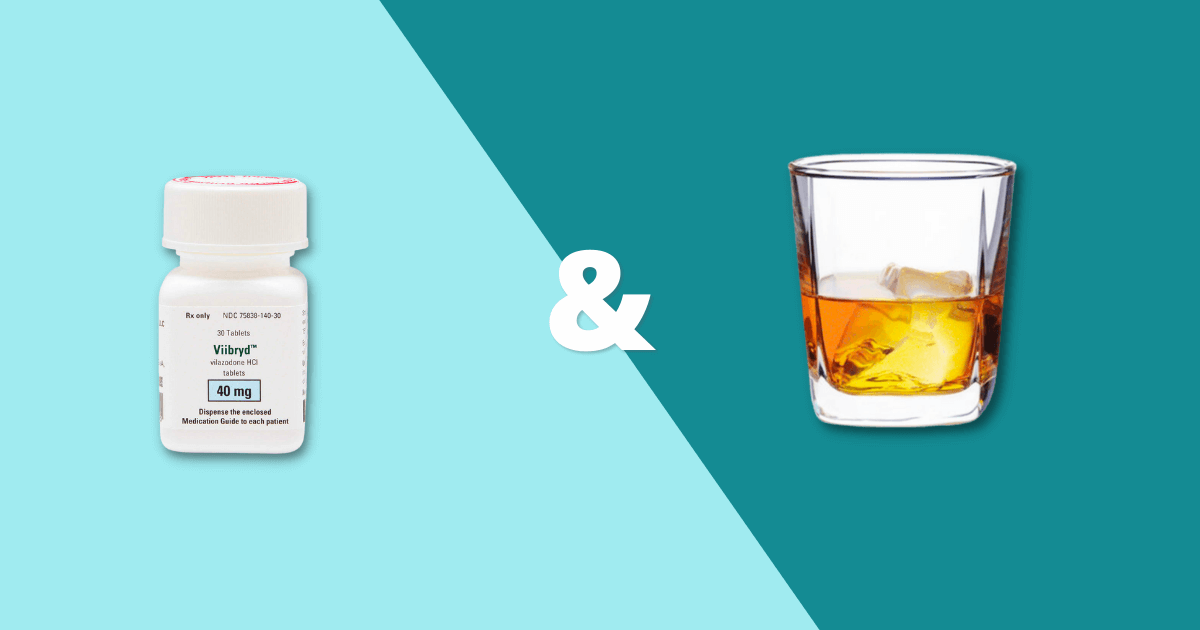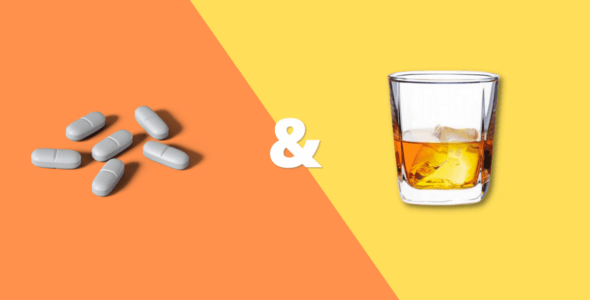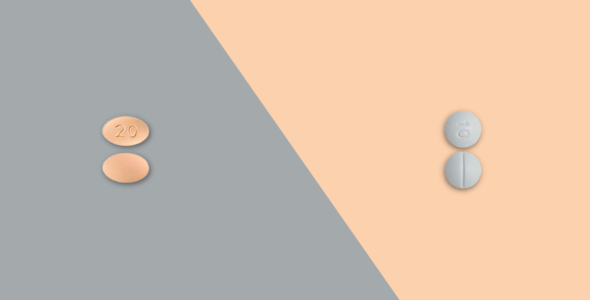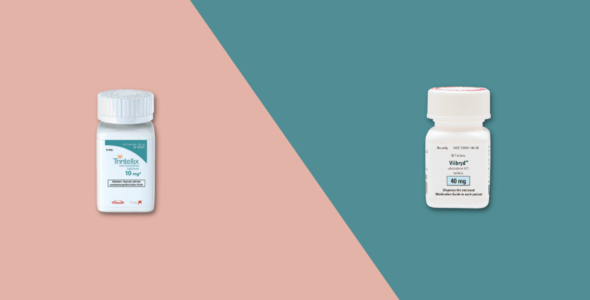Viibryd and alcohol: can they be used together?
Table of contents
Viibryd is an FDA-approved antidepressant medication. It contains the active ingredient vilazodone which is classed as a selective serotonin reuptake inhibitor (SSRI). It is used to treat major depressive disorder (MDD), a mental health condition. Depression is also a part of bipolar illness. People with bipolar disorder who take antidepressants may be at risk of alternating from symptoms of depression to mania. Symptoms of mania include an irritable mood, overconfidence, decreased need for sleep, racing thoughts, and risk-taking behavior.
If you have MDD, you may notice that it impacts your quality of life, including your relationships, social habits, sleep, and appetite. If you add alcohol into your life the potential for problems increases greatly. Mixing Viibryd and alcohol is strongly discouraged by healthcare professionals. Read on to find out more about this.
What are the different types of antidepressants?
There are various classes of antidepressant medication. Below are the main ones:
Selective Serotonin Reuptake Inhibitors (SSRIs)
Viibryd belongs to this category. It is thought to work by correcting the imbalance of serotonin, a neurotransmitter in your brain. Low levels of serotonin may be linked to symptoms of depression. Some other commonly prescribed SSRIs are Paxil (paroxetine), Prozac (fluoxetine) Lexapro (escitalopram), Zoloft (sertraline), and Celexa (citalopram).
Serotonin and Norepinephrine Reuptake Inhibitors (SNRIs)
These work similarly to SSRIs. This type of antidepressant stops the brain from removing both the serotonin and norepinephrine that are released naturally. Norepinephrine helps enhance awareness and focus, as well as allowing the brain to create and recall memories. SNRIs create a build-up of norepinephrine to help combat the fuzzy, distant feelings often associated with depression. Common SNRIs include, Cymbalta (duloxetine), Effexor (venlafaxine) and Pristiq (desvenlafaxine).
Monoamine oxidase inhibitors (MAOIs)
Certain alcoholic beverages contain a substance called tyramine that can cause serious side effects if consumed while taking MAOIs. Side effects include a sudden, dangerous increase in blood pressure. Doctors will advise you against alcohol use if you are taking an MAOI. Tyramine is also found in certain foods, so your healthcare provider will give you advice on which foods to avoid. Excessive tyramine in the body can also cause dangerously high blood pressure. Marplan (isocarboxazid), Nardil (phenelzine), and Emsam (selegiline) are commonly prescribed MAOIs.
Viibryd is contraindicated in patients taking MAOIs, or those within 14 days of stopping MAOIs. This includes MAOIs such as linezolid or intravenous methylene blue, because of an increased risk of serotonin syndrome.
Tricyclic antidepressants (TCA)
TCAs show their greatest side effects during the first few weeks of treatment. At this point, it is not a good idea to consume alcohol. A few weeks after side effects have passed it’s generally considered safe to drink small amounts of alcohol. Elavil (amitriptyline), Silenor (doxepin), and Pamelor (nortriptyline) are commonly prescribed TCAs.
Norepinephrine and dopamine reuptake inhibitors (NDRIs)
Drugs in this category include Wellbutrin SR and XL (bupropion).
What Are The Possible Side Effects Of Viibryd?
Common side effects of Viibryd include:
- Diarrhea
- Nausea
- Dry mouth
- Drowsiness
- Trouble sleeping
Serious side effects include:
- Glaucoma – symptoms of angle-closure glaucoma may include eye pain, changes in vision, swelling, or redness in or around the eye
- Serotonin syndrome symptoms such as palpitations, or irregular heartbeats when taken with sumatriptan, rizatriptan, tramadol, St. John’s wort, triptans, buspirone, and MAOIs
- Viibryd may increase the risk of bleeding events. The combined use of aspirin, non-steroidal anti-inflammatory drugs (NSAIDs such as ibuprofen, or naproxen), warfarin, and other anti-coagulants may increase this risk. This may include gums that bleed more easily, nose bleeds, or gastrointestinal bleeding. Some cases have been life-threatening
- Viibryd and other antidepressants may increase suicidal thoughts or actions in young adults, especially within the first few months of treatment, or when the dose is changed. Viibryd is not recommended for use in children
To minimize drug interactions and the worsening of possible side effects you must inform your health care professional about any other medical conditions you have. Tell them about any other prescription drugs, over-the-counter medications, or supplements you may be taking. If you are breastfeeding and taking Viibryd, talk with your doctor about the potential risks and benefits.
This article is not medical advice. You should always speak with your doctor about your health conditions before commencing any treatment as they can provide you with specific drug information for Viibryd.
Get your Viibryd medication for only $49 per month
Get StartedCan you mix Viibryd and alcohol?
Taking Viibryd with alcohol is strongly discouraged by healthcare professionals. Viibryd can worsen the effects of alcohol, while alcohol can worsen antidepressant side effects. When you have depression, you have an increased risk of developing a substance use disorder. Mixing Viibryd with alcohol can lead to alcohol abuse, causing you to have the potential to become alcohol dependent. If you drink and develop an addiction to alcohol, it will become more difficult for you to control your symptoms of depression and to get your alcohol consumption under control.
The combination of alcohol and antidepressants can be very challenging if someone is drinking, binge drinking, heavy drinking, or has an alcohol use disorder prior to taking the antidepressants. Furthermore, if someone decides to stop taking drugs for depression and starts drinking alcohol for symptom management instead, they can worsen their symptoms of depression, in some cases leading to suicidal thoughts.
Getting help
Antidepressants are a useful option for depression but there are other ways to help you cope with your mental health condition. Your healthcare provider can discuss other treatment options and provide you with health information about mental illness. If you are concerned about yourself or a loved one’s alcohol use, joining a support group or a program such as Alcoholics Anonymous may help. The National Alliance on Mental Illness is also a useful resource that provides support and information to individuals with mental illness.
Medically reviewed
A medical professional has reviewed this article.


Jamie Winn, PharmD
Jamie Winn, PharmD
Dr. Jamie Winn received his Doctor of Pharmacy in 2002 from the University of South Carolina College of Pharmacy, Columbia, SC. Jamie is a medical reviewer for NiceRx.





